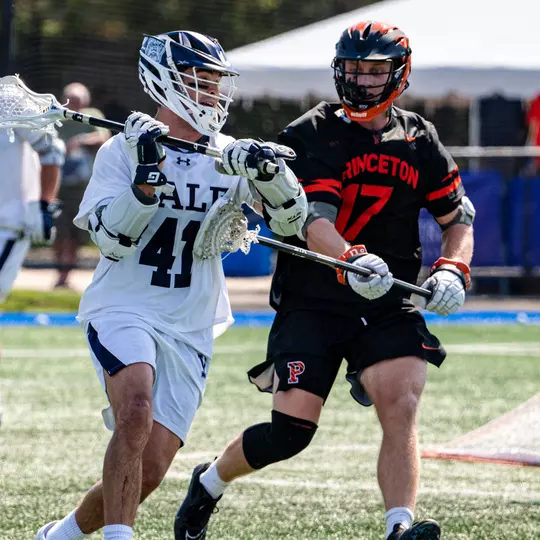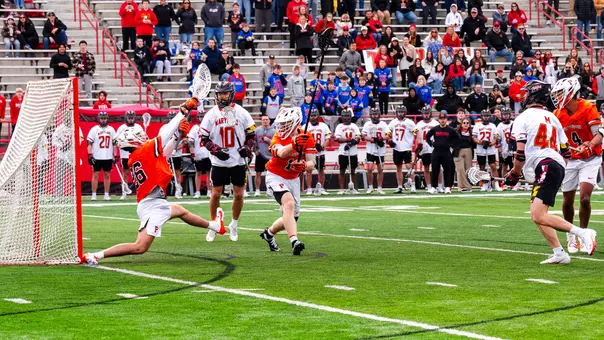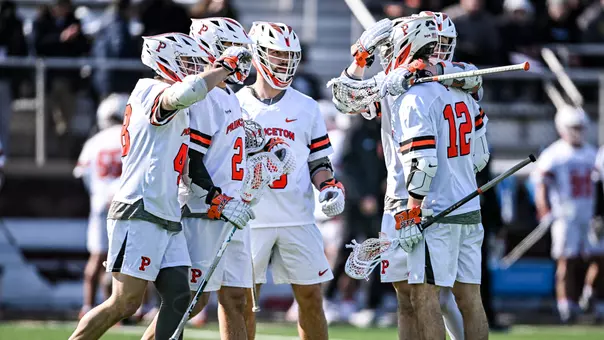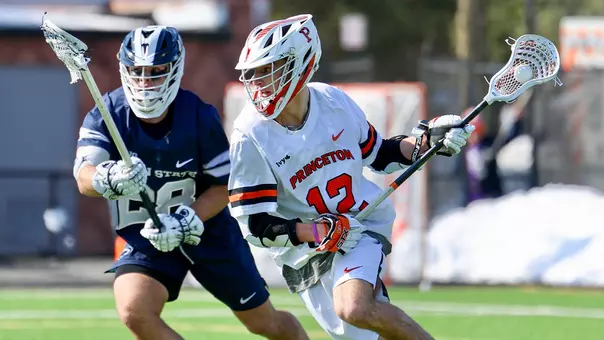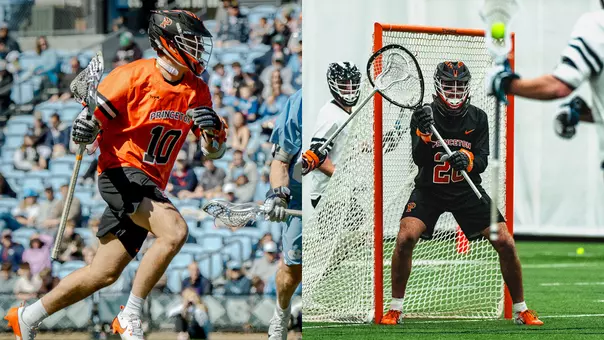Princeton University Athletics
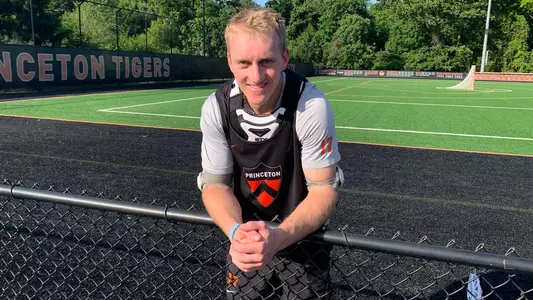
Feature Story: The Fiery Cauldron Of Intensity
May 26, 2022 | Men's Lacrosse
The fiery cauldron of intensity that is George Baughan on a lacrosse field has only one setting. He’s hypersonic, at all times. First quarter. Fourth quarter. The score doesn’t matter. The opponent doesn’t matter. The point of the season doesn’t matter.
Hypersonic, at all times.
He has a linear way of playing. He’s a Point A-to-Point B force on the Princeton men’s lacrosse defense. There’s the ball. There’s the other guy with the ball. There’s the goal. Don’t let them meet. He plays with such a relentless fury that it takes its toll mentally as much as physically against the attackman he is guarding. He will hound you all over the field, sideline to sideline.
“He makes it so that by the end of the game, you don’t even try to dodge him anymore,” says Michael Sowers, Princeton’s all-time leader in points. “You just don’t want any part of him after a while.”
If anyone at all knows what it’s like to have to face Baughan’s intensity, it’s Sowers. They battled each other for three years as Tiger teammates, and their practice matchups were legendary.
“He is a unique guy,” Sowers says. “That’s the word I’d use for him. He’s unique. You could use ‘leader’ or ‘relentless’ or even ‘freak,’ because they all apply. Add that all together though, and the word that best sums him up is ‘unique.’ He’s one of the best leaders, one of the hardest workers and one of the toughest guys I’ve ever been around. He’s one of the most competitive people you’ll ever meet.”
Sowers went from Princeton to Duke for a postgraduate year, playing in the ACC and ultimately making it to Championship Weekend last year before becoming the No. 2 pick in the Premier Lacrosse League draft. He’s played professionally and internationally. He knows a thing or two about what it’s like to go against the very best defensemen.
“George is the toughest to beat that I’ve ever gone against,” Sowers says.
He means it too. Baughan’s Princeton career is a long litany of wiping out the other team’s best, going back literally to his first game, not to mention every drill he ever did with Sowers.
“We’d do one-on-one drills in the winter where we were the only two people out there,” Sowers said. “It didn’t matter. He just refused to get beat. It would get chippy, actually, and it was just the two of us. He has the athleticism and skillset, but he also has this competitive nature. He’s just not going to get beaten. Your goal is to get the ball into the net or get to this spot on the field. He’s simply wired to do everything he can to not let that happen.”
Baughan has saved his very best for when it’s been needed most, in this year’s NCAA tournament, as he has led a reborn Princeton defense that has propelled the Tigers into this year’s Final Four in West Hartford, where the Tigers will take on top-seeded and unbeaten Maryland in Saturday’s second semifinal, after Cornell and Rutgers play at noon.
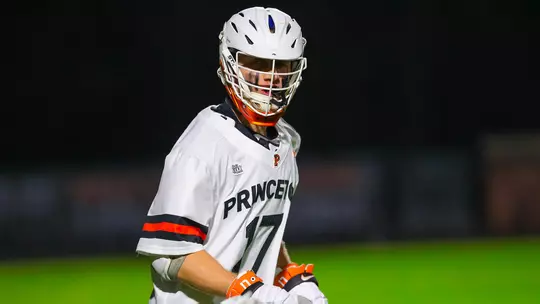
Between Princeton’s 12-5 win over Boston University in the opening round and 14-10 win over Yale in the quarterfinals, Baughan has guarded two attackmen who combined for 86 goals between them this season. He’s held them to one — and that one came in an unsettled scramble off a rebound. Those two attackmen shot a combined 1 for 11 against Baughan.
“We love George,” says Princeton head coach Matt Madalon simply. “Everybody in our program does.”
This is not the first time that Princeton lacrosse has had a No. 17 on its defense who could combine Baughan’s physicality, ferocity and sprinter’s athleticism. When Princeton won the first of its six NCAA championships back in 1992, the defense was led by that No. 17, David Morrow, who would also be the national Player of the Year in 1993, when Princeton returned to the Final Four. When the whistle blew, Morrow, too, had the same linear mentality that broke every opponent’s spirit. Morrow, at 6-0, 190 pounds, even had the same build as the 6-1, 195-pound Baughan.
If you go back to that era, though, it's not Morrow with whom Baughan as the most in common. No, it’s actually with that team’s head coach, Bill Tierney. During a game, Tierney was (and, at Denver, still is) wired similarly to Baughan and Morrow. The second the game ends, though, Tierney shuts that side of himself down and becomes so calm, so engaging, so humble, so, well, nice, that it takes people who don’t know him well by surprise when they experience it for the first time.
Baughan is exactly the same way. When you talk to George Baughan away from the field, you would never guess he’s the same player you just watched. On the field he is scowling at all times. Off the field he’s always smiling, always laughing. He speaks so softly and with such humility that it’s hard to balance that with how he plays.
“Off the field, he has a completely different vibe,” Sowers says. “He’s a funny, easy-going guy who is always playing pranks in the locker room. He’s so much fun to be around. If you just watch him play, you would never guess that.”
“He’s calm,” Madalon says. “And then he unleashes this intensity, and he just plays so hard at all times. And then he goes back to being calm.”
There is also another side to George Baughan, the academic one. He is one of the best students anywhere, on any campus. He graduated earlier this week with a degree from Princeton’s School of Public and International Affairs, with a grade point average that was close to perfect. He represents the very best of what college athletics are supposed to be.
Baughan’s senior thesis topic was the Global War on Terror and 9/11 and the impact it had on Chinese counter-terrorism towards the Uyghurs in Xinjiang. He wrote two junior papers, including one entitled " State Surveillance and Security in Xinjiang: The Role of the Private Sector," which he presented to the Council on Foreign Relations in New York City and to the State Department and White House officials in Washington D.C.
Think about that. Baughan, a Princeton undergraduate and lacrosse player, presented to members of the highest level of the United States government.
“I was pretty nervous about it,” Baughan says. “I was lucky to have [lacrosse teammates] Owen [Engel] and Terrell [Seabrooks] with me. They’re two of the smartest guys ever to come through our program. They were dialed in from the start. Then there I was. I got through it though. Whenever I get nervous, I think of that moment, and I draw on that. It was intimidating, but I got through it.”
On a Championship Weekend that will feature players from some of the biggest high school powers in lacrosse, Baughan’s background is a bit different. His parents Nick and Eileen are triathletes (Nick was also a hammer thrower at Columbia), and he was an athlete from early on, just not in lacrosse.
“I played almost everything,” he says. “Basketball, football, soccer, baseball, track. I tried lacrosse in third grade but didn’t like it.”
He came back to the sport he’s come to excel at in eighth grade. This time, it stuck immediately.
“On the first day of practice, the coach handed me a D pole,” he says. “I fell in love with it. I had been a basketball player, and I was never good offensively. I loved the defensive aspect. Lacrosse was all the same footwork, the same having to get through picks and trying to match the other guy’s body. You do all the same things in lacrosse, but you also have a six-foot pole to whack people. I quickly learned I enjoyed playing defense a lot more than standing in center field.”
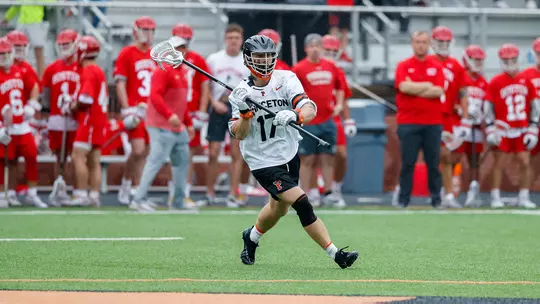
Baughan grew up outside of Philadelphia, where some of the best high school lacrosse in the country is played. There are two Springfield High Schools in Suburban Philly. One of them has won multiple Pennsylvania state championships. The other is the one he attended.
“We were playing a different sport than we’re playing here,” Baughan says. “I was pretty raw.”
“Hah,” Madalon says. “Yes. Raw. The first time I saw him play was in a pounding rain storm on a grass field at a fall event at the Hill School in Pennsylvania. He was an LSM just chasing people everywhere around the field. Every time the ball moved, he had an ability to close that was better than everyone else. He just looked different. I saw him again at a high school game later. Jesse [Bernhardt, then a Princeton assistant and now the Maryland defensive coordinator] and I were there. We just watched him run all over the place. We left at halftime guessing it would take until his junior year to figure out how to play.”
“I had no idea what to expect when I got here,” Baughan says. “I never knew anyone who played Division I lacrosse. I was motivated by fear, actually. I didn’t want to embarrass myself.”
Further complicating things for him was the fact that he broke his wrist in his final high school game, which meant he couldn’t do any stickwork, weight training or team activities through the summer and into fall practice. All he could do was conditioning, and that’s where his can’t-miss-it speed and athleticism first were obvious.
He was finally healthy for the start of spring practice for his freshman year of 2018 … briefly. He’d break his thumb in a scrimmage against Albany, but when he was cleared, he found himself in a place nobody would have expected for someone with such a limited background — in the starting lineup.
“The coaches saw something in me that I didn’t see in myself,” he says. “They believed in me. Then I had some success, and it gave me confidence.”
Some success? He was thrown the wolves, with matchups against players like future Tewaaraton winner Ben Reeves from Yale and current PLL player Jules Heningburg from Rutgers. Though nobody knew who he was or had any idea of what he could do, he started to build a reputation as someone who could win a matchup. Then came his game against Cornell.
Princeton went into the game needing a win and a Dartmouth win over Brown to get into the Ivy tournament. While Brown took care of the Big Green to end the Tigers’ season, Baughan became the national Player of the Week after what he did.
He was matched against the seemingly unstoppable Jeff Teat, who had torched Princeton for 12 points a year earlier. This time, Baughan shut out Teat, holding him without a goal or an assist while causing four turnovers. Baughan even scored a goal of his own as Princeton won 14-8.
“George has this imposing nature to him,” Sowers says. “You know early on you’re not going to get anything easy off him, and if you try you’re going to get beat up in the process. That game was exactly what I’m talking about. Jeff didn’t want to go against him anymore by the end, and you’re talking about Jeff Teat, one of the greatest players out there.”
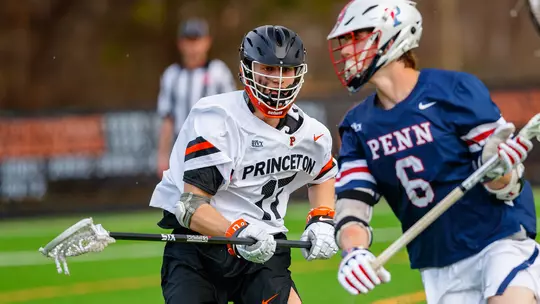
Baughan earned second-team All-Ivy honors as a freshman. His sophomore year saw him named unanimous first-team All-Ivy and honorable mention All-American, but again the Tigers missed the Ivy League tournament. With Sowers as a senior and on the deepest team Princeton had had in years, the 2020 season looked like it would be a breakthrough one.
That’s certainly how it started. Princeton went 5-0 out of the gate, with no game closer than the four-goal win over defending champion Virginia in Charlottesville. The Tigers were poised to make the kind of run they’ve made this year, and Sowers was headed straight to the Tewaaraton Award. Instead, the pandemic hit, and in the blink of one surreal week, Princeton went from beating Rutgers 16-11 to move up to No. 2 or No. 3 in every poll to having it all shut down. By the following Saturday, instead of opening the Ivy season against Penn on Sherrerd Field, Baughan was back at home, unsure of what was to be. There would be no conclusion to the season, though Inside Lacrosse named him a first-team All-American.
By the summer, Baughan and his 10 classmates had a tough choice to make. Should they stay enrolled without knowing if they’d get to play in the spring of 2021, or should they withdraw and preserve their eligibility? The only one who stayed enrolled and graduated was Seabrooks, who had an acceptance to Harvard Law School.
“It was really tough,” Baughan says. “We didn’t know what the acceptance rate would be for the year off, and it was possible that if you withdrew, you wouldn’t be able to come back for two years. We all applied to have the option. That was quick. Then we weren’t sure what to do if, say, half of us got it and the rest didn’t? It wouldn’t have been fair for half of us to have that experience. Luckily Princeton was very good about it. We all got the chance to take one gap year, and we decided we had to do it. The time off was daunting, but it was also exciting. It was so amazing to be able to step away from this place. Princeton is so special, but it’s also a bit of a bubble. We were able to step out and get some experience.”
They’d live in Park City, Utah, where they’d keep sticks in their hands but not really have anywhere to play. They did a lot of hiking, a lot of working out. They spent a lot of time together. Then it was off to Austin, Texas, for the spring, by which point they all had internships. They’d work, and they’d lift.
“By the end of the spring, we were craving lacrosse,” Baughan says. “We were craving the structure here. We spent a lot of time talking about what we were going to do when we came back.”
Nobody had any idea what to expect from Ivy League lacrosse after not having finished 2020 or played in 2021. There were many who wrote off the league, in fact, thinking that the year away would have major damage to the league’s programs. At the very least, the teams had to deal with a year of missed player development. Each team had two full classes of players who had never been in a game before.
“To see how it’s manifested has been special,” Baughan says. “I knew we had the pieces. I knew we had so much talent. Honestly, I didn’t know what the year away would do, how it might hurt us. You can’t replicate practices with coaches. It was different for us without game experience. We knew we had the talent. I just wasn’t sure what that year away had done.”
Instead of being a lacrosse afterthought, the Ivy League was instead top to bottom easily the best league in Division I. A record six Ivy teams reached the NCAA tournament. Princeton played all seven other NCAA seeds and beat five of them. Of Princeton’s 15 games, there have been 11 against teams that reached the tournament.
Princeton actually did not make the Ivy League tournament after giving up 37 goals in the last two games of the regular season, falling into a tie for fourth and missing a tournament spot on one of the deeper tiebreakers. The good news was that with all of the wins, Princeton was assured of an NCAA spot, and a home game at that, which meant the Tigers had a week off to regroup. In between, Baughan was named a unanimous first-team All-Ivy selection again.
“I have no idea what happened,” Baughan says. “I was thinking ‘were we regressing? Have we gone cold at the wrong time?’ We had to think less and play harder. We got the two weeks off, and we got the swagger back. And the physicality.”
If there was any uncertainty as to how Princeton would react, it was erased quickly against BU. The Tigers shut out the Terriers in the first quarter and held their attack — the highest-scoring attack in Division I by the way — without a point. Then came Yale, a team that no current coach or player had beaten. This time, as Baughan held Yale’s Matt Brandau, as good an attackman as there is in the country, to that one goal with one assist, Princeton had every answer.
The game was sealed in the final two minutes when Baughan stepped into a passing lane, deflected a pass intended for Brandau and in one motion scooped it off the turf.
Now he was running it up the field. Behind him was another attackman who had felt what it was like to have to deal with the hypersonic tenacity of George Baughan.
Ahead of him was open space. He ran the ball across the midline, and he didn’t stop until Princeton was back in Championship Weekend.
— by Jerry Price
